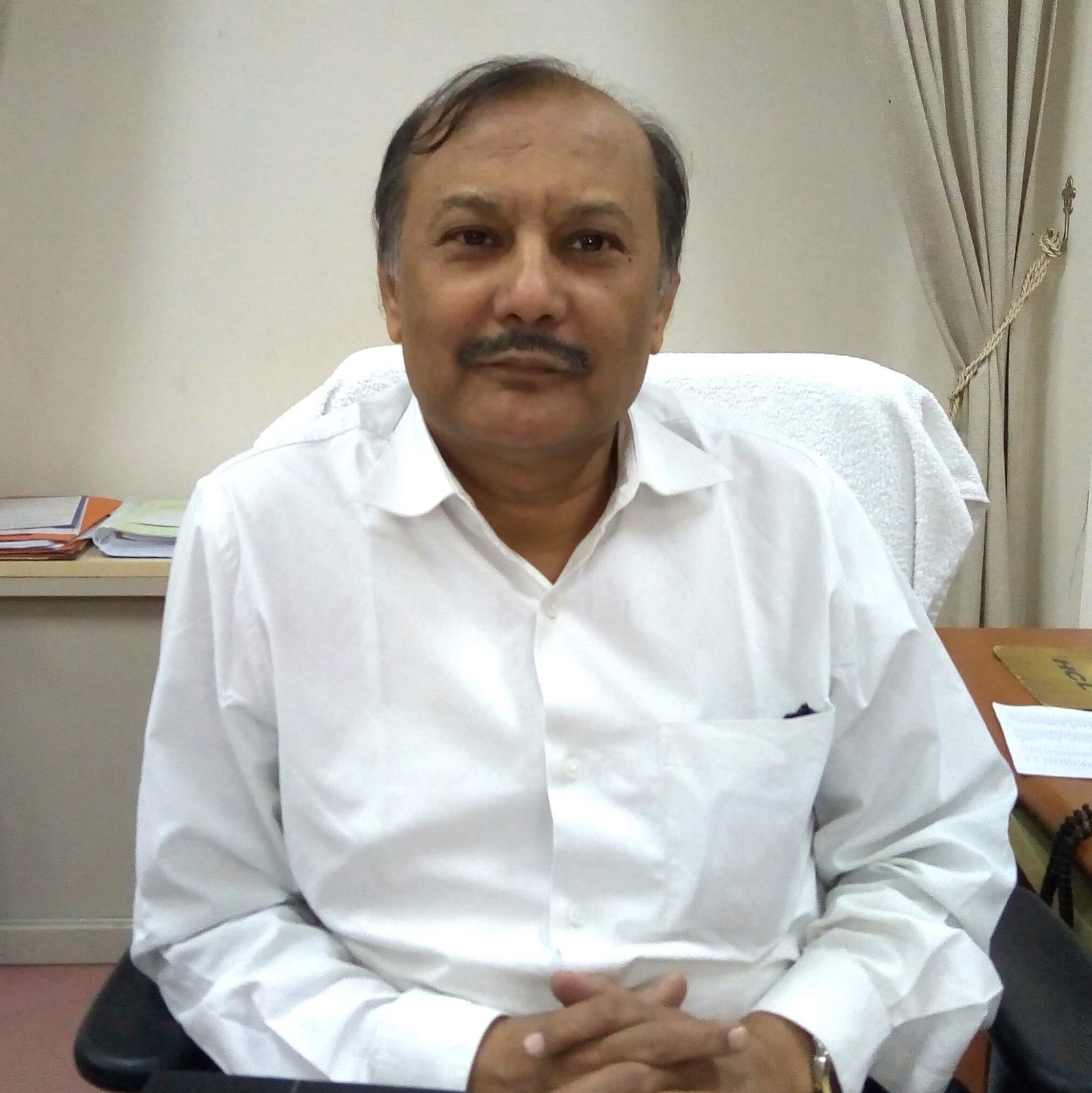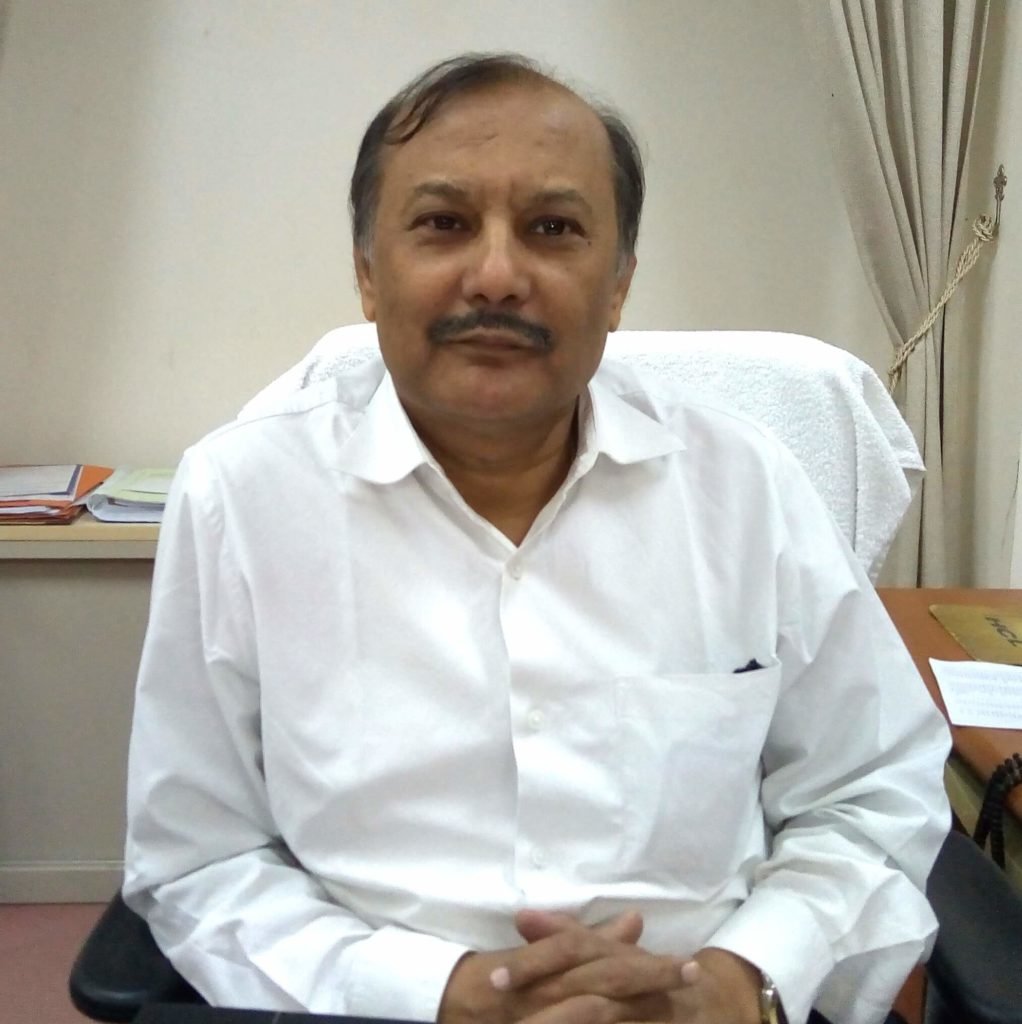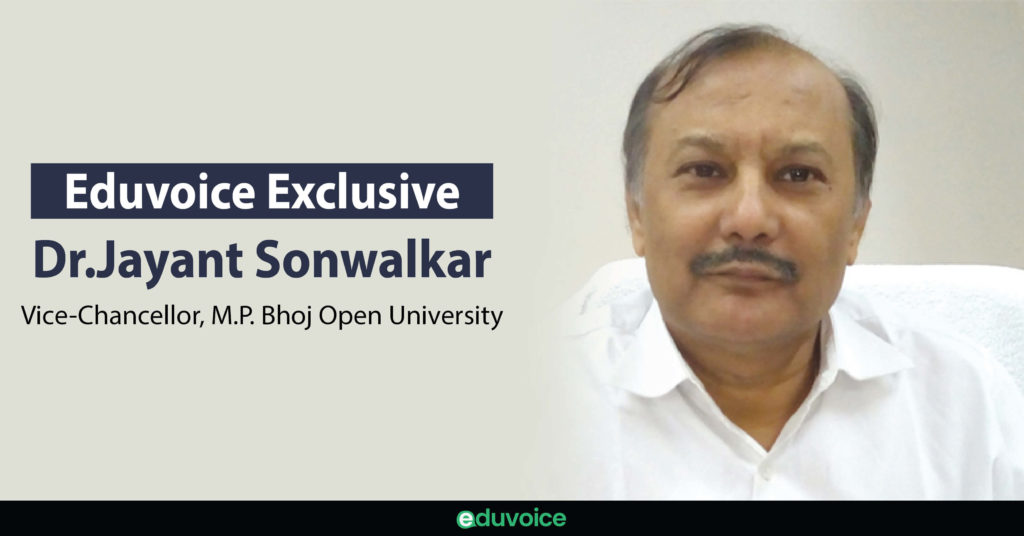Eduvoice exclusive interview

Dr. Jayant Sonwalkar
- Vice Chancellor, M.P. Bhoj Open University, Bhopal
- Has Trained over 4000 people in SME sector, Over 2000 people in Export Import Area and Over 2000 in Marketing, Strategic Management, Education Management area
- Expert in Teaching at Masters and Ph.D. Level
“When someone decides to excel on a global level, and not only among their colleagues or in their state, development takes place.”
introduction
The education system comprises three major elements, the infrastructure, the teachers, and the students. Since the teachers are such a vital element, they are one of the key factors that need to be developed to improve the overall education.
We need more academicians and faculty who possess the sincerity and willingness to grow as well as improve in their personal and professional life.
In an insightful discussion with Dr. Jayant Sonwalkar, who is the Vice-Chancellor of M.P. Bhoj Open University, Bhopal, and specializes in guiding faculty members to conduct international-level research, I learned a lot about faculty development programs.
During the conversation, he spoke about the difficulties as well as hurdles faced in faculty development. Mr. Sonwalkar also talked about the future of open and distance education.

Sujata Mehta
You are well known for transforming the institutions from national to international level. What are the changes the head of the institutes expect to bring in the institute after the transformation?

Dr. Jayant Sonwalkar
Transforming an institution is a big decision. To transform, firstly one has to know what their strengths as well as weaknesses are and what is the environment into which they wish to transform.
Some institutes which are in existence since the last 200-300 years don’t wish to transform themselves while some organizations may decide to do so just after 25 years only.
So, this is a decision that has to be taken by the top authorities. Once they decide to do so, they need to examine factors like;
- What is the current position of the institute?
- Where do they wish to take it in 5-10 years?
- Why are they transforming?
- What are the benefits of the transformation that they will avail of shortly?
For every organization, there are opportunities as well as threats in the environment.
It’s the heads who have to decide whether the University has a scope of transformation and it has enough strength or not. For an impactful transformation, you need to have a strong team that knows where it is heading, and each member of the team should work together for at least 2 to 5 years.
Overall, it’s a long decision and a long process.
SUBSCRIBE TO OUR NEWSLETTER
Get latest updates about our Exclusive Interviews, News, Articles on Higher Education Sector.

Sujata Mehta
Today our major focus is on updating curriculums to improve education. Do you think we should focus more on faculty development programs?

Dr. Jayant Sonwalkar
It is very important to focus on faculty development. The elements of the education system include building infrastructure, the teachers, and the students. After that comes the supporting environment like computers and libraries.
Out of these three elements, the faculty is the most important one. If you go back to the gurukul system of Indian education, there used to be competitive exams to get into the Ashrams of the Gurus. The Gurus used to have the complete right to accept or reject a student.
A mechanized system was then implemented by the Britishers and over the years, in the pursuit of teaching, we have become mechanized due to this, we forget to revise our syllabuses.
Earlier it used to be done every 5 years, and now, because AICTE has mandated that it should be revised every three years, it is taking place more effectively.
The students must get the latest knowledge and that the latest knowledge has to be delivered by the best faculty. If the faculty themselves are not ready or are not trained enough, the students won’t attend their classes.
This is why we end up hearing from the teachers that the students don’t attend their classes, and they only start coming when the exams are close.
This is not the case in UTDs and IIMs. In these institutions, all the students come to class and the attendance is 85-90% just because they have better faculty. Therefore, if the faculty is good, most of the problems of the education system will be resolved.
We need to pay the utmost attention to faculty development programs. Another suggestion which I also proposed in the National Economic Policies meeting, which was a meeting of about 700 Vice-Chancellors; was that faculty from practical sectors like engineering, management, etc., must be sent back to the industry every five years, for one year. After this, they should come back and teach.
This is very important because if the faculty is not exposed to current technologies and trends then s/he won’t be able to provide relevant information to the students and train them effectively. It’s just like a doctor who practices surgery but cannot operate a patient. If a doctor is more bookish, he will not be able to diagnose the patients correctly.
That is why it is imperative for the faculty to train themselves every five years and to update themselves on their knowledge.

Sujata Mehta
We see that institutions hesitate to enroll their faculties in such development programs. How can we encourage them to put their faculty forward in these development programs?

Dr. Jayant Sonwalkar
There are multiple reasons for this. If you talk about private institutions, they cannot leave their faculty because the faculty here does everything other than teaching, like keeping records, and all other such tasks. So these institutes don’t wish to lose their manpower for a month or so.
In government institutions, people are lazy, the teachers don’t want to go, or the HOD doesn’t want his teachers to go and he allows only his favorite teachers for such programs. So, there is a lot of politics that goes on.
Another thing which I have observed is that when the female faculty members get settled in their lives and have kids, they restrict themselves from growing and developing further.
They hesitate to do this because if they go and learn new things, they will have to teach new classes. Be it male or female faculty, nobody wants to get out of their comfort zone. They don’t want to learn new subjects.

Sujata Mehta
We know how important faculty development is. Should we plan some norms and compulsions to get them into action?

Dr. Jayant Sonwalkar
There are certain compulsions already in existence. Once you become a lecturer, and unless you attend two long time faculty development programs, of 21 days, authorized and certified by UGC and AICTE, you cannot get promoted to the position of an associate professor or leader. Similarly, you need to attend two more to be promoted further.
Also, what happens in these programs is that there are groups from different subjects and there is a mix of people. Thus, a very non-specific program is conducted. The faculty development programs should be more specific and workshop based, where more practical work is done.
Like in IIMs, they used to have faculty development programs of three months but now they have reduced the tenure to one month; even in one month, they teach the faculty for 6-8 hours and provide exercise or homework for 4 hours a day.
Unless the faculties themselves get sincere towards these kinds of programs, it is very difficult to develop them. It is always a two-way process, the faculty should be eager to learn and their teachers should be able to train them well.
This eagerness should arise as a result of the competition itself. If my colleague is performing well, I should do even better than them. If this kind of healthy competition gets into the faculty development programs, then it will become an automated process.
The new policies do take care of this. They have reduced the period of the programs and have made it compulsory for the faculties to attend these programs in every 2 to 3 years.

Sujata Mehta
Certainly changes in the policies have been made but are they enough for the transformation of institutes?

Dr. Jayant Sonwalkar

Sujata Mehta
If we look at it, the faculty development program is more than just for developing education and the students. It is for the betterment of the faculty themselves too. So, should we be motivating the faculty to improve themselves?

Dr. Jayant Sonwalkar
Yes, absolutely but unfortunately, there exists a kind of lethargy in many of the Indian faculties. I am very much Swadeshi, but still, I see that the lethargy is the highest in Indian faculty. They think that “My salary will remain the same for the next 8-10 years as an associate professor then Why should I work hard?”
So people don’t put in the extra effort. “If others aren’t doing so, why should I?” is their mentality. A change in this should come from within.
If you see, the number of researchers has gone down in universities because of this. They think that they have a Ph.D., so why do research now?
Thus, UGC made it compulsory to write two papers before the Ph.D. is awarded. Still, some faculty members will write two papers and stop. Research work should be done for personal and professional satisfaction, not just for the sake of doing it.
I met a 50-year-old faculty from the finance department on my trip to the US. Later I came to know about her, that in the 30 years of her career, she has written 45 books, 200 research papers in US Journals, she was the editor of 10 journals, and she was publishing two journals herself!
If we start writing a paper for the US journals, we take from six months to a year to publish them!
When I checked the profile of that institute, I saw that almost all the faculty has 20-30 books in their name and nearly 100 papers.
“When someone decides to excel not only among their colleagues or in their state/country but also globally, only then development takes place.”
The government is trying hard to make universities globally known but the biggest hurdle is lack of research work.

Sujata Mehta
I agree, that research is one of the hurdles in our path and it is stopping us from becoming global platforms. As per you, what steps should the government and the institutes take to make research a more sought after thing?

Dr. Jayant Sonwalkar
I think people in research are starting to do well now, thanks to the policies and awareness. As per the statistics, for the last two years, the articles from Indian authors in international journals have increased to 40%! All thanks to Government policies!!
Not only should we start writing good articles in international journals, but we should also start publishing international journals, by making a global editorial board.
When UGC made it compulsory to publish two articles every year, even though that policy was no longer in existence, at that time, a lot of Indian publishers mushroomed. Even from a small city or taluka, they published international journals.
We need more than just this. We need to have an international editorial board, an international reviewer board, and then if we publish journals, we will grow very rapidly.
I am very optimistic about my approach, and I think the number will increase very fast and things will improve.
With that being said, a lot still has to be done.
The biggest hurdle in writing research is that there is no hand-holding being done. Senior professors don’t guide their juniors.
One of the toxic things in the Indian psyche is personal jealousy. This is much more in India than in any other country and it is highly visible in their behavior.
The senior professors feel that their junior will excel and move ahead of them if the junior completes his/her Ph.D. and writes in an international journal. Finally, tomorrow the junior will become their competitor.
When you are already an established professor and you have your path of growth, how will anyone cross your path?
They should feel confident about themselves. It is their job to train the younger generation to write better and publish better journals. The openness of the mind should come with the senior faculty members and they should give a lot of time in hand-holding and training their juniors.

Sujata Mehta
The pandemic is transforming the way we see education. It has opened up ways for virtual classrooms and distance learning in colleges. What is your view of open learning and distance education post COVID era?

Dr. Jayant Sonwalkar
We are currently in the COVID era and are passing through it.
There were times when people were not using online transactions, and due to Modi Ji’s efforts, Paytm overnight became popular. Similarly, in these times, apps like zoom or google classroom have automatically become very popular.
I have been fighting for universities to go online for the last 10 years and that is why when I became the Vice-Chancellor of this open university, I was very happy.
It was now my turn to make my university go online. This is God’s gift and a blessing in disguise.
You must have heard that in the last few days our finance minister announced that 100 universities are to be given sanction to start online programs.
If each university starts 35-40 courses, 4,000 courses are going to be offered very soon and our country will be full of online programs and online courses.
So, my assumption of post-COVID times, which is yet to come, is that post-COVID video conferencing will be a norm. It will not be unusual. Already a lot of universities have started taking Ph.D. vivas on video conferencing.
When I suggested this to one of the Universities in Madhya Pradesh before this situation, the answer I got from the Dean of the faculty there was that “it is illegal” and “please don’t force us to do this, You come to take the viva.” Today, he is telling me that you are most welcome to take your viva online!
Within just 60 days, even our mindset at Bhoj university has changed. We never used to take lectures online on platforms like Youtube, but now, we have taken over 250 classes online.
Technology will get into our lives faster as well as in a more intense manner and we will be able to use it productively. People should use technology for their benefits because it saves a lot of time.
If you were to come to take my interview from Delhi, you would’ve taken at least 2 days to come but now you took it in just a short span of half an hour!
This is going to become a norm and post the COVID scenario, people will appreciate open and distance learning. The gap between regular and distance learning will fade away in India, which the other nations already have bridged.
If you go abroad for a job and you tell them that you have completed your education from a distance university, they won’t raise an eyebrow but here if you go for an interview and if you have done distance learning and if some other candidate has done regular learning, then he is preferred over you, which is not at all correct.
Therefore in the current and the coming times are prosperous for the nurturing of online as well as distance learning.
The conversation with Dr. Sonwalkar was eye-opening. He surely inspires me to keep growing and developing myself and advises all the faculties to do the same.
For More Such Articles, News Update, Events, and Many More Click Here







